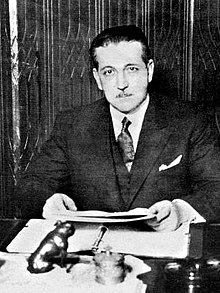Alfredo Baldomir
This article relies largely or entirely on a single source. (October 2020) |
Alfredo Baldomir Ferrari | |
|---|---|
 | |
| 27th President of Uruguay | |
| In office 19 June 1938 – 1 March 1943 | |
| Vice President | César Charlone |
| Preceded by | Gabriel Terra |
| Succeeded by | Juan José de Amézaga |
| Personal details | |
| Born | 27 August 1884 Paysandú, Uruguay |
| Died | 25 February 1948 (aged 63) |
| Political party | Colorado Party |
| Spouse | Sara Terra |
| Alma mater | University of the Republic, Uruguay |
| Occupation | Politician, soldier, architect |
Alfredo Baldomir Ferrari (August 27, 1884 – February 25, 1948) was a Uruguayan soldier, architect and politician. He served as President of Uruguay from 1938 to 1943 and is most notable for leading Uruguay to support the Allies during World War II.
Background
[edit]Baldomir was born in Montevideo. He joined the army in 1900 and studied architecture and engineering. He designed many famous buildings in Uruguay, eventually directed the army corps of engineers and worked as a professor.
By 1930, Baldomir was becoming involved in politics. He served as chief of police of Montevideo from 1931 to 1934 and as defense minister of Uruguay from 1935 to 1938, and was thus strongly identified with the rule of his brother-in-law, then President of Uruguay Gabriel Terra.
President of Uruguay
[edit]He was elected President of Uruguay in 1938 as a member of the long-ruling Colorado Party. He took office as President on June 19, 1938; the Vice President of Uruguay during his period of Presidential office was Alfredo Navarro. Baldomir set a high priority in involving Uruguay in international affairs, and appointed the famous diplomat Alberto Guani as foreign minister.
World War II
[edit]As World War II broke out (Baldomir was President during the Battle of the River Plate), Baldomir discouraged support for the Axis within the country, and early in 1942, he broke off diplomatic relations with the Axis Powers. In 1942, Baldomir, now a general in the army, expanded his powers through a military coup dissolving parliament and declaring an emergency. His term, which was soon to expire, was extended for a year. Soon a new Constitution came into force.
In 1943, Baldomir voluntarily held elections and gave up power, but the continued dominance of the Colorados was ensured.
Later life
[edit]Baldomir retired from presidency on 1 March 1943. He was the president of Banco de la República Oriental del Uruguay from 1943 to 1946.[1]
In 1948 he died of an illness in Montevideo.
Legacy
[edit]Baldomir's actions to identity[clarification needed] Uruguay with the Allied cause in World War II have lessened his reputation as a controversial historical figure. It may be noted that he was a leading supporter of the previous President of Uruguay Gabriel Terra, who ruled by decree.
See also
[edit]References
[edit]- ^ Diego Aboal and Gabriel Oddone. "Reglas versus Discrecionalidad: La Política Monetaria en Uruguay entre 1920 y 2000" (PDF). Banco Central del Uruguay.


 French
French Deutsch
Deutsch